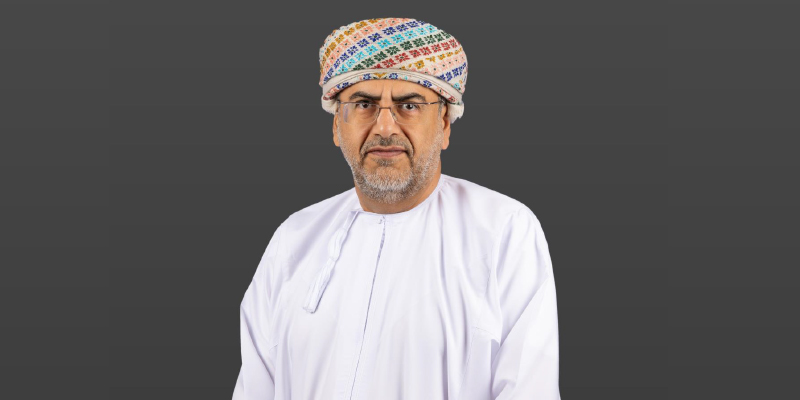
03 Apr Interview with Said bin Mohammed bin Ahmed Al Saqri, Minister of Economy, Sultanate of Oman
JT: What are the Ministry’s top priorities in driving economic diversification, and how do you ensure alignment with the Vision 2040 objectives?
Al Saqri: Diversification is essential for long-term sustainability. While Oman’s economy has historically depended on oil and gas, we’ve been working to reduce this reliance since the discovery of oil in 1967. Although oil still accounts for a significant portion of our GDP—32% in 2023 compared to 53% in 2000—we’re focusing on sustaining growth, improving living standards, and accelerating development. Manufacturing plays a key role, driving job creation and economic growth. Our next five-year plan prioritizes the green economy. We aim to invest in renewable energy, particularly solar and wind, to integrate sustainability into our economy. By 2030, we plan to produce at least 1 million tons of green hydrogen, reducing our reliance on hydrocarbons. This will also open up opportunities in manufacturing, including the production of solar panels and wind turbines—Oman will need 40 million solar panels and numerous turbines by 2030. We’ll rely on advanced technologies from global partners like Japan, ensuring a low-emission, efficient, and sustainable manufacturing sector. Oman’s strategic location along international shipping routes makes logistics and transport vital for economic diversification. We’ve invested heavily in infrastructure, including ports, airports, and world-class road networks, positioning Oman among the top 10 globally for road quality. We’re also focusing on improving regional connectivity, such as the GCC railway project, to strengthen our position in global trade. Tourism is another key sector, with Oman’s diverse landscapes and rich cultural heritage, dating back to settlements before 6,000 B.C., making it an attractive destination. The mining sector, rich in rare minerals for the green economy and resources for construction, will also play a major role in diversification. Finally, agriculture, fishing, and the digital economy will continue to drive growth and competitiveness across all sectors.
JT: What is the Ministry’s plan to leverage Oman’s strategic geographical position, and which countries do you see as potential partners in this regard?
Al Saqri: Oman has a long history of trade across the Indian Ocean, engaging key markets such as the Indian subcontinent, the Horn of Africa, and West Africa, with maritime reach extending as far as China. Japan is becoming an increasingly important trading partner, offering advanced technology and expertise that complement Oman’s economy. Our energy resources align with Japan’s needs, and we share a deep cultural connection, particularly through the seafood industry. Oman also maintains strong ties with the U.S. through a free trade agreement and is working on free trade agreements with Europe, Japan, and other Asian nations. These partnerships will shape Oman’s trade landscape in the years ahead.
JT: With the global economy undergoing rapid digital transformation, how is the Ministry supporting the adoption of digital technologies to drive innovation and economic growth?
Al Saqri: Oman is advancing its transition to a knowledge-based economy with a focus on building a thriving digital economy. This is being driven through the National Digital Economy Program and the National Program for Artificial Intelligence and Digital Technologies, launched in 2024. Oman has improved its rankings in global indexes, advancing nine places in the E-Government Development Index and climbing 26 positions in the Telecommunications Infrastructure Index. We also ranked 74th in the 2024 Global Innovation Index. Our goal is for the digital economy to contribute 10% of GDP by 2040. To achieve this, we are implementing several initiatives, including our Smart Government program, upskilling 10,000 IT graduates, and equipping school graduates with essential digital literacy skills. Additionally, we’re expanding R&D funding in collaboration with the Ministry of Higher Education to foster a knowledge-based economy driven by innovation.
JT: What opportunities exist for Japanese companies to invest in Oman, and how is the Ministry facilitating partnerships with Japan in key sectors?
Al Saqri: Oman warmly welcomes Japanese investors and tourists, offering a stable and hospitable environment. The country boasts a rich culture, delicious cuisine, and attractive investment opportunities. Japanese expertise and technology are highly valued, and investors can benefit from incentives such as tax holidays of up to 30 years, well-developed infrastructure, and a business-friendly atmosphere. Key sectors for investment include manufacturing, renewable energy, digital economy, tourism, and logistics services. These sectors are vital to Oman’s economic diversification and growth, helping sustain development across the Sultanate.
JT: What is your vision for Oman’s economy over the next 5 to 10 years, and what key developments can we expect during this period?
Al Saqri: Oman’s five-year development plan focuses on sectors like manufacturing, tourism, mining, logistics, and agriculture, all powered by a green economy. We aim to expand renewables and recycling while reducing hydrocarbon dependency, creating job opportunities and supporting SMEs. Logistics, bolstered by Oman’s strategic location, will be pivotal, with regional collaboration on a rail link and the development of integrated manufacturing cities along the Oman-Saudi corridor. Five new cities are emerging: Nizwa for tourism, Sohar for manufacturing and aluminum, Duqm for logistics and food processing, Najd for food security and mining, and Sultan Haitham City, Oman’s first smart city, which will feature sustainability-driven designs and modern technologies. These initiatives present significant opportunities for Japanese firms in energy, seafood, and manufacturing.
JT: Do you have any closing remarks for our readers who are considering visiting or investing in Oman?
Al Saqri: Oman is ready for partnerships, and we invite you to visit, explore, and invest in our growing economy.
